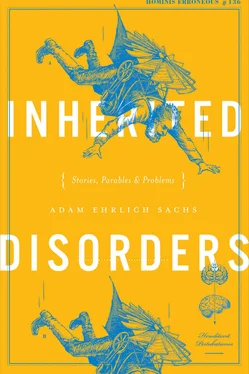…………………….
The insane son of the Israeli prime minister and the insane son of the chairman of the Palestine Liberation Organization, patients at the same Jerusalem psychiatric hospital, have accomplished what their supposedly “sane” fathers have never been able to: they have agreed on a peace plan for the Middle East. Although the peace plan makes little sense and seems not to refer to the world in which we live, the simple act of these two men, one Jewish and one Muslim, both profoundly psychotic, meeting in the TV room every single day and shaking hands for up to twenty-five minutes at a time while chanting, in unison, at the top of their lungs, the demented terms of their “peace plan”—this simple act may, we hope, serve as an inspiration to their fathers.
…………………….
In January, the Stupendous Bosches, a family of acrobats celebrated for their “inverted pyramid” trick, collapsed while performing the inverted pyramid at a circus in Bremen. Six Bosches across three generations were killed.
Only the bottom Bosch, the tip of the inverted pyramid, survived.
This happened on the very same day, at the same hour, that Professor Pasternak, the distinguished mathematician whose family had long ago formulated the Pasternak Problem in combinatorics, leaped to his death from the top of St. Isaac’s Cathedral in St. Petersburg.
Professor Pasternak was survived by his son, a fellow mathematician.
There was, of course, no reason to suspect a link between these two tragedies. But when Bremen police spoke to the bottom Bosch, and Petersburg police spoke to Professor Pasternak’s son, they made an unlikely discovery: the bottom Bosch was a Pasternak, and the last Pasternak was a Bosch. Police in both cities were stumped, and neither Bosch nor Pasternak would say another word.
Berlin’s best detectives were sent to Bremen. How had a Russian mathematician infiltrated their nation’s most beloved upside-down acrobatic configuration? Moscow dispatched its best detectives to Petersburg. How had a German acrobat infiltrated their nation’s most esteemed mathematics department?
Eventually it emerged that Bosch, the youngest son of the Bosch acrobatic clan, and Pasternak, the youngest son of the Pasternak mathematical dynasty, had met by chance on a riverboat cruise of the River Daugava in Riga, where one (Bosch) had come to perform with his family’s circus act, and the other (Pasternak) had come to speak on his family’s problem at a combinatorics conference.
According to a Latvian computer programmer who was also on the cruise, the two men were initially amused by their physical resemblance, which was striking, Bosch’s beard notwithstanding. They started talking, comparing their respective responsibilities as the most recent offshoots of two legendary families.
The conversation grew heated. Evidently, each believed his burden was the more onerous.
In the inverted pyramid formation Bosch had to physically support three generations of male Bosches on his shoulders. His father stood on his right shoulder, his brother on his left shoulder. On his father’s shoulders stood his paternal grandfather and his great-uncle, and on his brother’s shoulders stood his maternal grandfather and a first cousin twice removed. All this a hundred feet in the air, on a high wire. One wobble and his entire family fell to their doom, shouted Bosch. And they weren’t just standing there, they were juggling, a stream of machetes flying back and forth between the grandfathers, not to mention the great-uncle’s five flaming torches, et cetera!
Pasternak merely laughed, the Latvian programmer recalled.
So Bosch had six living Bosches standing once a night on his back, is that right? asked Pasternak. That’s nothing. He had twelve generations of Pasternaks, both living and dead, standing at all times on the surface of his brain, in a treacherous variant of the inverted pyramid you might call a vertical column formation . Twelve generations ago, in 1744, his ancestor presented the Pasternak Problem to the Imperial Russian Academy of Sciences. He spent the rest of his life thinking about the problem, but he failed to solve it. So did the next ten generations. So did Pasternak’s father. And now it fell to him. He had been given every resource, every advantage. His father had even cut short his own mathematical career to provide his son with a top-notch mathematical upbringing. All the best schools, the best teachers. Training in Germany, France, and America. He had nearly three hundred years of past Pasternak thinking to draw on. It was, as his father put it almost every morning, time to solve this thing.
That , said Pasternak, is what I call a burden. Twelve dead men standing in a column on my brain. I would kill to have six live family members juggling on my back! I would feel as light as a feather!
My God, said Bosch the acrobat, what I would give to feel nothing but the purely symbolic weight of your dead ancestors.
It’s heavy, said Pasternak.
I bet it’s not actually so heavy, said Bosch. What’s heavy is six physical jugglers.
The deal was struck then and there, the Latvian programmer told authorities. Pasternak would grow a beard and pretend to be Bosch; Bosch would shave his beard and pretend to be Pasternak. The first to capitulate to the pressure of the other’s family had to buy a round of beer.
Bosch taught Pasternak — who luckily spoke fluent German from his studies — the rudiments of acrobatics, and Pasternak taught Bosch — who spoke fluent Russian from his travels — the rudiments of combinatorics. Then Pasternak went with the circus to Bremen, and Bosch went with Professor Pasternak back to Petersburg.
Disaster struck both families immediately. In Bremen, six Bosches climbed onto Pasternak’s back, his knee wobbled, and they all fell to their deaths. In St. Petersburg, Bosch bungled a simple mathematical operation and Professor Pasternak realized that his son would never solve the Pasternak Problem. He went straight to St. Isaac’s and flung himself from its golden dome.
Presented with the evidence, Pasternak and Bosch confessed.
The Germans wanted Pasternak to pay, and the Russians wanted Bosch to suffer, but the best lawyers in both countries could not find a German or Russian law that they’d actually violated. Reluctantly, the police released them. They met up three days later in a Riga bar, where they split the cost of the round of beer. Freed from their acrobatic and mathematical obligations, each planned, exuberantly, to spend the rest of his life pursuing his actual passion: birding for Bosch and backgammon for Pasternak. But at that moment, Riga police burst in and hauled them off. It seems Latvia has an old, seldom-enforced law on its books forbidding the sale or barter of one’s dynastic duties. The penalty is death.
…………………….
A solipsist at New York University who’d convinced himself through ironclad argument that the world was a figment of his imagination submitted as his philosophy dissertation two selections from Hume’s Treatise of Human Nature and four from Wittgenstein’s On Certainty. Of all of the figments of his imagination, the student explained to his committee, he was proudest of the figment Hume and the figment Wittgenstein, whom he had considered his two principal influences before he realized they were actually his own creations.
The student was surprised when his dissertation committee — composed of two tenured figments of his imagination and one younger, untenured figment — accused him of plagiarism. He was brought before the University Disciplinary Board but declined to defend himself. It would be the height of insanity, he said, to defend himself before a University Disciplinary Board of his own creation .
Читать дальше












